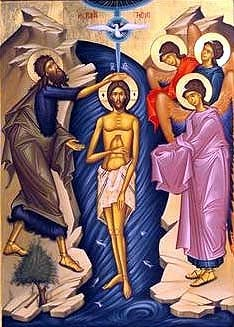Have this mind among yourselves, which is yours in Christ Jesus, who, though He was in the form of God, did not count equality with God a thing to be grasped, but emptied Himself, taking the form of a servant, being born in the likeness of men. And being found in human form he humbled Himself and became obedient unto death, even death on a cross. Therefore God has highly exalted Him and bestowed on Him the name which is above every name, that at the name of Jesus every knee should bow, in heaven and on earth and under the earth, and every tongue confess that Jesus Christ is Lord, to the glory of God the Father.
Philippians 2: 5-11 (Epistle on the Feast of the Dormition)
Among other things, we refer to the Virgin Mary as:
Greater in honor than the Cherubim, and in glory greater beyond compare than the Seraphim; you without corruption gave birth to God the Word, and are truly Theotokos. You do we magnify. (From the Matins service, Trans. by Fr. Seraphim Dedes)
The hymns of the feast of the Dormition focus on the life and the faith of the Virgin Mary and the event of her falling asleep. The Epistle from the feast, however, focuses on the person of Christ and what He did. Christ came into the world through the Incarnation. At the Incarnation, the Creator came to be part of His Creation. As we read in St. Paul’s Epistle to the Philippians, He “emptied Himself, taking the form of a servant, being born in the likeness of men.” (Philippians 2:7) He entered the world like one of us. He came into the world as a baby, grew into a boy and grew up to be a man, just like we are. Again, from Philippians, “being found in human form He humbled Himself and became obedient to death, even death on a cross.” (2:8)
Through His death and Resurrection, He not only abolished the power of death, but demonstrated the power of God over life and death, His own, and ours. This is why we believe that this man, Jesus, who died and rose from the dead is indeed the Christ, the Son of God. This is why, as St. Paul writes, “at the name of Jesus every knee should bow, in heaven and on earth and under the earth, and every tongue confess that Jesus Christ is Lord, to the glory of God the Father.” (2:10-11)
The saving work of Christ makes the contribution of the Virgin Mary so very important. Because when God was going to Incarnate His Son, to come and to redeem the world, He needed one of us to carry Him who was to become one of us. He needed a woman who could bear a child, but who would have the faith to participate in the mystery and miracle of having a child by the Holy Spirit, and the fortitude to stand in the face of a society that would scorn an unmarried woman with child. From the very beginning, she knew that God’s aspiration for her Child was for Him to die, in order to save everyone else. What a tall order that must have been for any mother. While we speak of Mary’s grace, and depict it in icons, no doubt she had all the emotions of a mother—joy, but also fear and worry. No doubt she had the pride that only a mother can feel at the success of her Child. And no doubt she had the sorrow that only a mother can feel when her Child dies. And not only that, she had to watch Him be betrayed, reviled, tortured and killed in the most heinous manner.
It is intentional for the Epistle of this feast to speak of Christ and His saving work because it sets the backdrop for us to honor the Virgin Mary, whose faith and whose sacrifice allowed the Incarnation as well as the subsequent crucifixion and Resurrection to happen as well. And again we learn the lesson that God has a unique plan for each of us to contribute to the well-being of our world. God’s call to the Virgin Mary was the most unique and special calling that a human being has ever had. This is why we give her more honor than any human being has ever been given.
Christ had to become like one of us in order to save us. He did that at the Incarnation. He did that because the Virgin Mary said yes to God’s unique calling to her.
What a paradoxical miracle! * For the fountain of life * is consigned to a tomb, * and the grave now becomes a ladder to heaven above. * Be glad, O Gethsemane, * the holy shrine of the blessed Mother of God. * With Gabriel as our chief, * come, O believers, and let us cry out to her: * Lady full of grace, rejoice, * for the Lord is with you, * and through your intercessions * He bestows great mercy on the world. (First Kekragaria from Vespers of the Dormition, Trans. By Fr. Seraphim Dedes)
May we each honor the Lord in whatever He has uniquely called us to do, in the unique way that He has called upon us to serve Him and to serve others.

